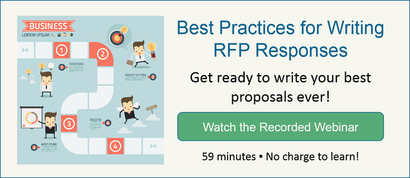When a request for proposal—RFP, RFI, or other detailed questionnaire is presented to your organization, is collaborative teamwork in place to answer the questionnaire, or is it passed around like a hot potato?
Too often, the sales rep tosses the RFP to the proposal manager to answer the questions against a tight deadline, with minimal help from others in the organization. When the proposal manager reaches out to subject matter experts (SMEs) for assistance, SMEs sometimes respond that they are too busy with "other priorities." It becomes a case of the “that’s not my job” syndrome.
The bottom line is that preparation of an RFP response that helps your organization win business requires a collaborative team effort. The document must be tailored to the specific client and include accurate and persuasive information. One person may “own” the RFP, but it takes the teamwork of many contributors to prepare a proposal that successfully responds to the client’s specific needs and requirements. All team members need to take ownership of this opportunity; no one should toss the hot potato!
The Winning Proposal Team is a Collaborative One!
SALES' role is paramount is helping guide the team towards the delivery of a solution and proposal that meets the specific client’s needs. Sales should have an established relationship with the prospective client, as well as a clear understanding of the client’s challenges and goals. When engaging the support of the proposal team, sales should identify the client’s hot buttons, proposed solutions, risk and benefit statements. This critical information must be woven throughout the response document—that is, included in every section such as the executive summary, as well as the specific answers to questions.
In most instances, the PROPOSAL MANAGER manager is the RFP’s project manager. Hopefully, proposal managers have a database of previously answered questions to quickly complete a first draft of the response document. Proposal managers or writers ensure that additional information required to complete the response is identified and assigned to SMEs, that project due dates and milestones are met, and that the response document is compliant with all requirements.
SUBJECT MATTER EXPERTS throughout the organization must contribute relevant information from their area of expertise. The proposal writer is a generalist, with broad knowledge about the organization and the solutions. The SMEs contribute specific details. SMEs may be engineers with technical information, product managers with feature functionality and roadmap knowledge, or IT team members with specific technical intelligence. It is never acceptable for an SME to say “it’s not my job to answer RFP questions.” SMEs are in the unique position to provide insight that no one else in the organization can. Responding to requests for information to help complete an RFP should be part of every SME's job description.
Finally, the delivery of winning proposals requires the support of the EXECUTIVE TEAM. It is the responsibility of the company executives to reinforce the importance of responsiveness to requests to assist with RFP responses. Executives must deliver the message that meeting revenue goals and closing business is each and every employee’s responsibility, and assisting with RFP response is part of that responsibility—and not a hot potato to be tossed about!

